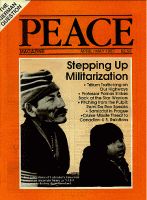
Peace Magazine Apr-May 1987, page 10. Some rights reserved.
Search for other articles by Kathleen O'Hara here
Paul Rogat Loeb, Toronto: D.C. Heath, 1987.322 pp. $10.95
What is going on in Reagan's America? What are ordinary people doing and thinking as their economic, military, and political leaders spin out of control in their nuclear obsessions? At the PEACE Magazine office we correspond and exchange subscriptions with several peace groups in the U.S. (The Dallas Peace Times is a favorite publication.) But few Canadians have regular access to this information and it's difficult not to conclude that the arms race has universal support down there. It doesn't.
Paul Loeb's book, Hope in Hard Times: America's Peace Movement and the Reagan Era, makes this clear. In Part One of the book, "Ordinary Heroes," Loeb introduces us to members of the Honeywell Project in Minneapolis who maintain a constant vigil at the arms manufacturing giant, Honeywell Corporation (this becomes the site of the largest arrest in the city's history); he takes us to Florence, Georgia, where, twenty-five years after an untriggered bomb fell on the town, a small peace demonstration marches to the near disaster. He recalls the debate surrounding the 1982 California Freeze Campaign (should peace be sold like soap?), and he looks at peace education in Boston schools. Finally, Loeb covers an attempted blockade of the Trident nuclear submarine (the USS Ohio, equal to 2000 Hiroshimas) in Seattle.
But Loeb is not just offering a kind of whirlwind tour of U.S. peace groups. He goes far beyond that. He wants his readers to come away with a clearer understanding of what motivates these "ordinary heroes" and what factors are working for and against them. Loeb analyses the role of patriotism, the presidency, and authority in general-those "sanctified experts" running the country, the state, or the local mill. He looks at the divisions created by racism, the role of religion, and the ghosts of Vietnam. He warns us about the middle class look of the peace movement so far, saying it risks appearing as "an effort of the pious and affluent to protect a world already theirs." And he weighs the effects of nuclear culture which "systematically denies the reality of barbarism created in our common name."
The first chapter of Hope in Hard Times focuses on Erica Bouza, the comfortable wife of the Minneapolis police chief. Loeb follows Bouza's political awakening in great detail, from the first leaflets she distributes at a local shopping mall to her first week in jail for demonstrating at Honeywell: (Her husband ordered the arrests.) Halfway through this chapter I began to wonder why Loeb expected his readers to be so interested in this woman. I was similarly dismayed by the detailed examinations of the lives and thoughts of peace workers in the following chapters. I wanted less personal information and more of the hard facts I need to do peace work.
Then I began to understand. Loeb's book-and the focus of Part Two, "Obstacles and Visions," is about a new kind of politics-"village politics." It's an appreciation of the diverse membership any large movement attracts and needs. Loeb clearly feels that peace activists require a knowledge of each other if they are to develop "the bonds of an opposition community," the foundation for change.

Peace Magazine Apr-May 1987, page 10. Some rights reserved.
Search for other articles by Kathleen O'Hara here